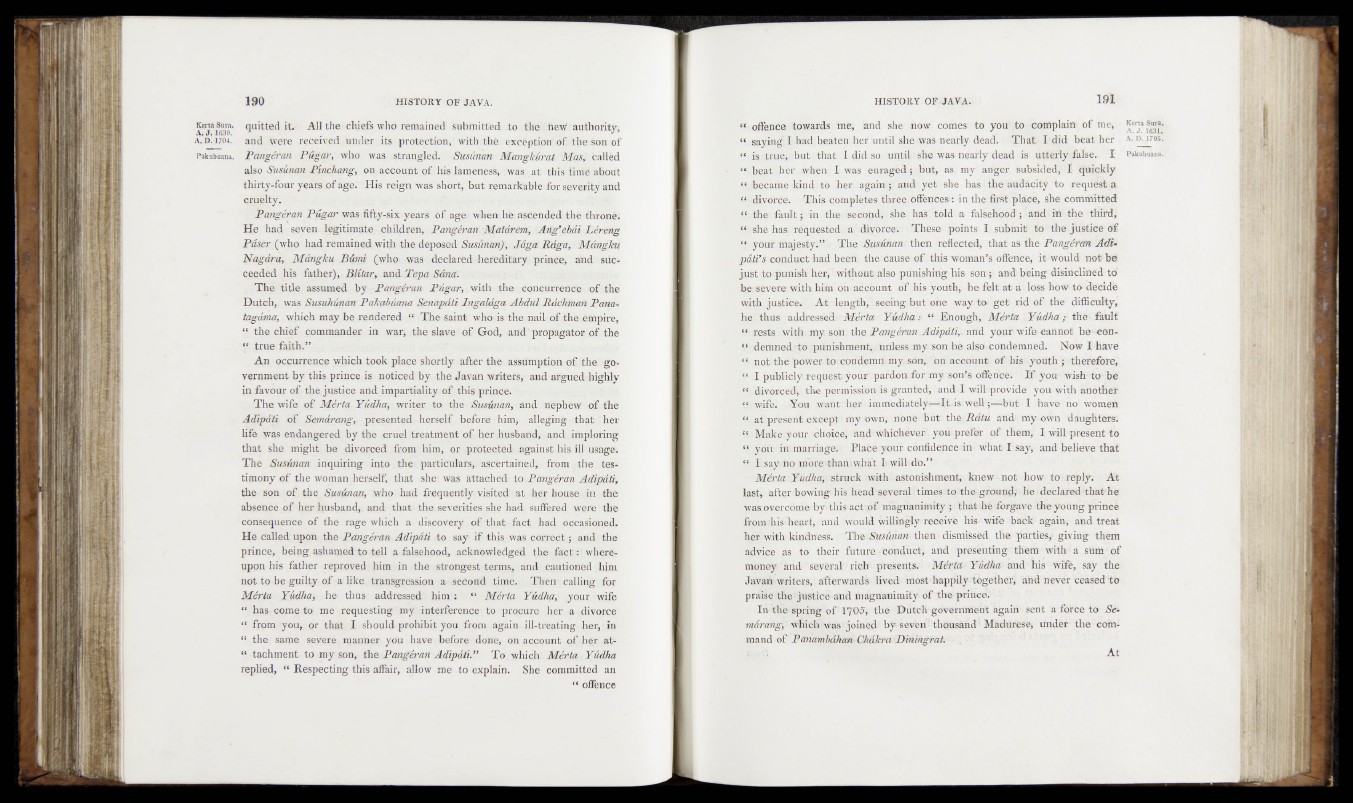
Kerta Sura.
À. J. 1630.
A. D. 1704.
Pakubuana.
quitted it. All the chiefe who' remained Submitted to the • bevif aulbotitÿ;
and w te received under its protection,' with tbè excëption of the son of
Pangéran Pûgar, who was strangled- Susûnan Mavgkurat Mas, ballèd
also Susûnan P'mchang, on account of bis lameness, was tm this fcimi a iw t
thirty-four years of age. His reign was short, but remarkable for severity and
cruelty.
Pangéran Pûgar was fifty-six years of age when hè ascended thé thtoné;
He had seven legitimate children, Pangéran' Matdrém, Arig’ebdi Péveng
Poser (who had remained with thé deposed Susûnim), Jffgé Pdga, Mângku
Pfagdra, Mângku Bémi (who was declared hereditary prince, sfad succeeded
his father), JBlitar, and, Tepa Séné.
The title assumed by Pangéran Pûgar, with the yeOneurçéâçç of the
Dutch, was Susuhûnan Pakabûana Senapdti Ingaldga Abdul Rdckman Papa*
tagdma, which may be rendered ‘e The Saint who is the nail of the empire,
“ the chief commander in war, the slave of God, and ' propagator" of the
H true faith.” j
An occurrence which took place shortly alter the assumption of The government
by this prince is noticed by. the Javan writefs,- and atguted-highly
in favour of the justice and impartiality of this prince.
The wife of Mérta Yûdha, writer to the Susûnaû, &nd riephewT of-the
Adipdti of Semdrang, presented herself before' him, alleging th$>-her
life was endangered by the cruel treatment of her husband; and? imploring
that she might be divorced from him, or protected against- his-llj usàgc.
The Susûnan inquiring into. the particulars, ascertained^, from t the', test
timony of the woman herself, that she' was attached to Pangéran Adipdti,
the son of the Spsûnan, who had frequently visited' at her house' in thé
absence of her husband, and that the severities-she had suffered' were the
consequence of the rage which a discovery of that-fact had occasioned*
He Called upon the Pdngérûn A dipâti to say if this was correct ; and the
prince, being ashamed fo tell a- falsehood, acknowledged the
upon his father reproved him in the strongest terms, and v cautioned him
not to be guilty of a' like transgression a sèCoifd time. Then Calling' for
Mérta Xpdha, he thus addressed him : “ Mérta Yûdha, :yöur ■ wife
“ has come to; me -, requesting | my interference to procure her a divorce
“ from you, or that I should prohibit you from again ill-treating her, in
“ the same severe manner ydu have before done, on account of her at-
“ tachment to my son, the Patigérart Adipdti.” To which' Mérta Yûdha
replied, “ Respecting this affair, allow me to explain. She committed an
“ offence
“ offence towards me, hnd. she mow comes to you to complain of me,
“ saying’ I'-had: beaten her until she was nearly dead. That. I did beat her
is .true, rbut that I did so until; she was nearly dead is utterly »felse. I
“ beaj her .When I was enraged 5 but, as my anger subsided, 1 quickly
(h became kind to her again. ;v aiid yet >sbe has i the audacity to request a
«idïvoreé. This completes“ tWeeioflences-: in the first place, she committfecf
“ the; feuit 5 in the ’secopd, she has. told a falsehood-; And in the third;
‘^ifcbe hasj-réquestecL a divorce... These- points I suhmif to the justice «6
« yóu'f majesty!?4 The Sasémam then reflected, that as &e Pangérékt Adi*
palps conduct had been’ the'-cause óf this woman’s offence, it-would* not be
just toepunisb her, without also punishing his son1;- and being disinclined-to’
heisevere with; him on. account of his youth,, he. felt at a lo® how-tb dfecide
with justice. -At/length, seeing but oóe way to- get rid“ of the difficulty,’
heVThus' addressed • Mérta Y.édha: “ Enough, Mérta I Yudha ; the- fault
rests with. my. soil ■ the Pangéran Adipdti, and yon-r wife* cannot be'-eon-
V-i-demned-fo. punishment,..unless ray son .be - algo condemned. Now I-have
% not*thé power 'torcondemn my. .son,Ton account of his“ youth ; therefore,
«< I publicly requetteji our'. pardon, for my son?s oflbnbe! I f you*-wish-to be
^.divorced; the permission is granfaetk, rand 11-will-pro vide you with another
wife; You wantrhp»- immediately— It-iswpll'j-^üt I have no- women
‘&.at^presfer(teXcept! my'own, nbnë Bat the:RMu and- my own daughters;
U Make yoUf choice; Snd'whichewen'. youiprefer of them, I will present to
V ypiu ini marriage:•: Place your, confidence in what I say, and believe that
“ Tsafuto t will db.”
MértatYédhai struck .with“ astonishment, knew- not how- to:-reply. A t
last; after bowingbis head several times to -the ground! he declared 'thathe
was:overc-Pme bythis act!.pf m%n‘animity $ ; that-héforgave -theyoung prineé
fromshisdieart, and would willingly- reoeive his- wife back again; and treat
her- with kindness. T h e S u s d n a n - then i dismissed the parties,- giving them
advice as to their future •'conduct; and presenting-them with- a sum1 of
money and several rich presents.! Mérta- Yiiêhé and ms wifè, say the
Javan writers, afterwards lived most' happily- tbgethé’r,' alkl never ceased to
praise the justice-and lhagnanimity^bf the prince;* - --
In thé spring The Dutch gbvernrtfent again sent a force to Semdrangi
which was joined by-'sevèri ■ thousand1 Madurese, under- the com-
mand of: Panambdhan Oftdkra 'Dinmgrat. |
. S i At
Pakubuana.